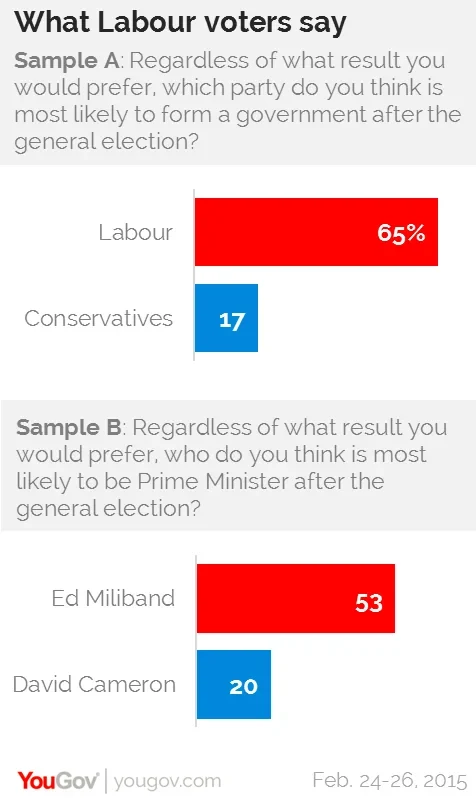A polling experiment sheds light on an electoral puzzle
The betting markets, the pollsters, even the voters are predicting the Conservatives will edge ahead by May 7. However, on the latest numbers, Labour are the likely winners. What’s behind this contradiction, and what does it mean for campaign strategy?
I conducted an experiment which throws some light on the problem. I asked 3,219 people to predict the outcome of the election. That sample was randomly split into two, with one half (sample A) asked whether Labour or the Tories would win, and the other half (sample B) whether Ed Miliband or David Cameron would win.
It is 99% certain that the two questions are, in practice, the same, and the prediction should therefore also be the same, but sample A showed 30% predicting a Labour win, but in sample B, 24% predicted Miliband would.

It means that a section of voters struggle to imagine Miliband as prime minister. That, in essence, is why the experts expect a late swing as the reality of the choice becomes imminent. When we look separately at each party’s numbers, the dissonance effect is zero among Conservative and Lib Dem supporters, but strong among Labour supporters (65% of them think Labour will win, 53% think Miliband will) and to a lesser degree among Ukip supporters (19% versus 11%). These are the voters the Tories are targeting with US-style attack ads aimed at the Miliband image, and doing it online through social media where it can have the greatest impact.
How should Labour respond? We have seen that the Conservative austerity message is unappealing. People think cuts in public services are harmful and unnecessary, and they feel personally vulnerable. They believe that the Tories do not care about ordinary people and that their economic policies, though effective, are aimed at helping the rich. This is Labour’s strategic strength. Miliband may never seem prime ministerial compared with Cameron, but he can be made convincing as the defender of the people.
It’s not too late: George Osborne delivers his final budget on March 18. This is the moment when the Tories will seek to cement their deal with the voters. That could give Miliband the opportunity to change the tone, doubling down on his creditable seriousness and sincerity of purpose.
A version of this article appeared previously in The Times







